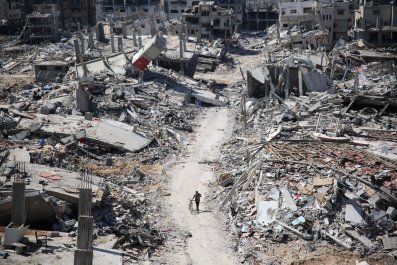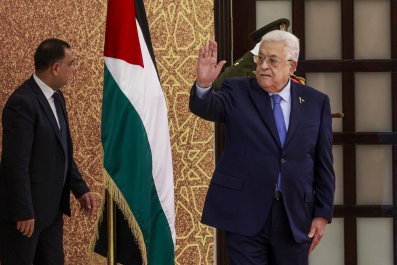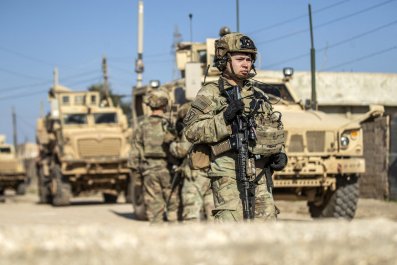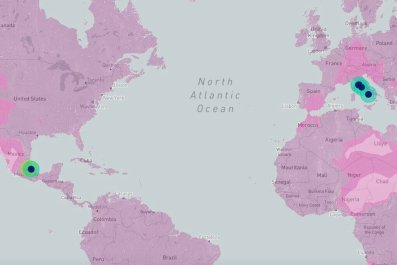Bishop Joseph Strickland did not always have a difficult relationship with Pope Francis. When Francis became the head of the Catholic Church, Strickland recalls admiring how welcoming the pope was. But as the pontiff began taking increasingly liberal stances, the bishop of Tyler, Texas, felt he could no longer stay silent.
As Strickland began speaking out about Francis' teachings, from the church's positions towards divorcees and LGBTQ+ people to the question of whether priests should be allowed to marry, he quickly realized that "Politically, I was in a rather precarious position."
"There's just a lot of politics in the world and it's a reality that affects the church as well," the bishop told Newsweek in an interview. Although he said he has come to terms with the action against him, Strickland said he worries that it could promote an "atmosphere of fear" within the church.
Strickland's removal last year was not only an unprecedented measure but also a sign of how the culture wars have polarized the church of 1.3 billion Catholics, with the battle lines nowhere more evident than in the United States. Under the leadership of Francis, the church has welcomed more people, including same-sex couples and divorced Catholics. The pope has also been outspoken on issues such as climate change, inequality, global capitalism and interfaith dialogue, all of which have meant a departure from the traditional teachings of the church. And while these positions have made Francis a hero among progressives and their allies, it has formed a rift with traditionalists.
The types of actions that Francis has taken against his conservative American critics have not been seen in centuries, said church historian and Villanova University professor Massimo Faggioli.
"In terms of the relations between a pope and the United States, it's unprecedented," Faggioli, who is also the author of Pope Francis: A Voice for Mercy, Justice, Love, and Care for the Earth, told Newsweek. "It started immediately after his election, and there was a clear sense that this pope was really different from the previous ones."
The Press Office of the Holy See did not respond to Newsweek's request for comment.
Inaugurated in 2013, Francis wasted no time in breaking with the conservatism of his predecessor Benedict XVI. Early in his papacy, Francis startled traditionalists when he asked, "If someone is gay and he searches for the Lord and has good will, who am I to judge?"
From there, it became increasingly clear that Francis was leading the church in a more progressive direction.
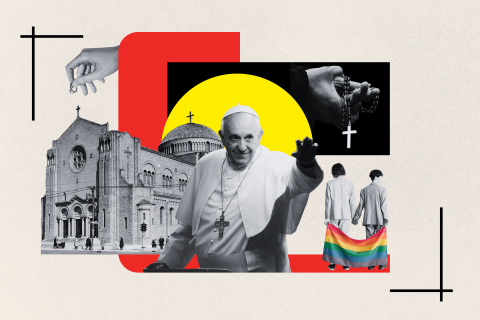
Central to the conservative pushback is the way Francis has embraced LGBTQ+ people. Attitudes toward the community have softened under Francis, and culminated last year in the pope's approval for a landmark ruling that said priests could administer blessings to same-sex couples under certain circumstances.
Opposition came from many parts of the world. Some 90 clergymen, scholars and authors from around the globe published a joint letter calling on all Catholic cardinals and bishop to oppose the document from the Vatican.
There was a particularly fierce backlash in one of the fastest growing regions for the church, Africa, where bishops called the idea "contrary to the will of God."
"This declaration has caused a shockwave," wrote Congolese Cardinal Fridolin Ambongo in a strong sign of dissent with Francis "In our context, this would cause confusion and would be in direct contradiction to the cultural ethos of African communities."
But Francis did not back down. In response, he slammed his opponents, calling it "hypocrisy" that those critics wouldn't have objected to him giving a "blessing to an entrepreneur who perhaps exploits people," but that they were "scandalized" by his blessing for "two people who love each other," even if they're of the same sex.
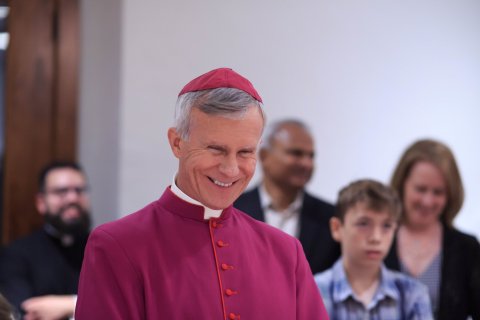
The culture wars in the church have resonated globally, and the divide is easily depicted in two New York City parishes, where the vastly different opinions of Francis are separated by just two miles.
Reverend Mark Hallinan of the Church of St. Ignatius Loyola, a Roman Catholic parish on Park Avenue in New York City's Upper East Side, for one, is grateful that Francis has called on the church to put a "greater emphasis on mercy and compassion."
Hallinan told Newsweek that some of his parishioners had been "very appreciative" of the outreach by Francis, but he does note there are some who have been "impatient with the pace of change," acknowledging that the pope is not always "free to move as far as he might like."
The mood is distinctly different at the Church of the Holy Family in midtown Manhattan, where Reverend Gerald Murray refers to Francis by the nickname the "Pope of Surprises."
"Not all surprises are welcome," Murray told Newsweek. Murray said he took issue not only with open criticisms by Francis of "what he calls the 'ideological' opposition of some Catholics in the United States," but also the pope's refusal to "consider the substance of those criticisms."
In the face of repeated sniping from conservative bishops in the United States, Francis sent a clear message to his critics last year. Over the summer, he criticized some conservatives in the United States Catholic Church for "backwardness" saying they showed "a very strong, organized, reactionary attitude" and had replaced faith with political ideology. Toward the end of the year, he moved against them.
Weeks after Strickland was relieved by the Vatican in a one-line statement, Francis took the unprecedented step of revoking Cardinal Raymond Burke's right to a subsidized Vatican apartment and salary.
Burke, a traditionalist cardinal from Wisconsin and one of the highest-ranking critics of Francis, received notice in late November that he was to begin paying market rate rents on the apartment or surrender it by the end of February.
While the church never explicitly detailed why Strickland was being removed, nor reveal the findings of its monthslong investigation into his governance at the diocese in Tyler, Strickland believes he was ultimately ousted because he was "not with the program."
After all, a month before the pope's decision, the bishop had called it a "travesty."
"I loved what Pope Francis said early on in his pontifices because he spoke a lot about reaching out and welcoming people," Strickland said. "But what troubles me is, as things have developed, it's like, 'Reach out to the marginalized and just leave them marginalized.'"
"I just don't see how you can really guard the deposit of faith but say, 'Oh, the faith changes.' That's not what the Bible says," he added.
At his house in a rural area outside the town of Tyler, nearly four months after his removal, Strickland seems as calm and cheery as the sunny, yellow room he sits in. Even though he has had to leave the Catholic Diocese of Tyler himself, Strickland continues to tell his supporters, "Please don't walk away from the church."
He has also continued to speak out, while saying he recognizes the pope's challenges and respects his authority.
In a strongly worded letter "to all of my brother bishops around the world, including Pope Francis," Strickland told his fellow Catholics on February 29: "Let us stand with our brothers, who in the 20th century, were strong enough to speak against despotic rulers even though they were a minority voice in their time."
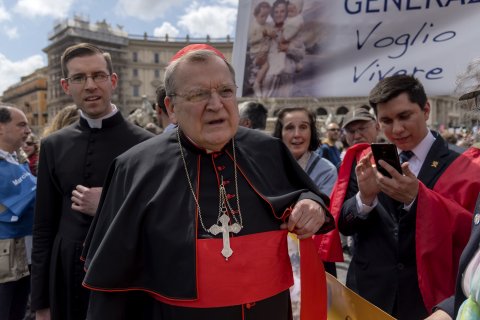
Scholars say that Francis walks a tightrope when addressing ideological conflicts because he also must ensure that his cardinals and bishops do not question or cast doubt over the legitimacy of his authority.
Much like a president expects his cabinet to toe his line, the pope expects his cardinals to serve as a physical and tangible link between the Vatican and Catholics around the world. Because Cardinal Burke had repeatedly questioned the teaching of Francis, the pope decided "he doesn't have to subsidize [Burke] to do that," National Catholic Reporter's Vatican correspondent Christopher White, told Newsweek.
Unity in the church is not easy to achieve and some are pushing the pope to become more liberal.
One of the most prominent progressive challenges to Francis is Germany's Synodal Path, a group that has called for the pope to do more to include divorcees, women and LGBTQ+ people within the church. They have also asked the church to reconsider its current structure so that nonordained members can play a greater role by choosing bishops and even preaching at Masses.
"There's no question that [Francis] is deeply concerned, perhaps even more concerned in some ways, with what's happening in the German ecclesial," David Lantigua, a moral theology professor at the University of Notre Dame, told Newsweek. "The pope has, on a couple of occasions, made it clear that the German Synodal Path has kind of set itself up as another council of the church and that it's potentially headed in a direction of breaking from the church or schism."
While critics of Francis, both traditionalist and progressive, are outspoken, most Catholics support their pope. A 2021 Pew Research Center poll found that 82 percent of U.S. Catholics have a "very" or "mostly favorable" opinion of the pope, and that the majority of all Americans, 63 percent, support Francis.
Even newly elected right-wing Argentine President Javier Milei, who had at one point described the pope as an "imbecile" and a "filthy leftist," has changed his tone. Since taking office, the right-wing libertarian has softened. In February, he embraced Francis at mass in the Vatican City days after calling him "the most important Argentine in history."
But traditionalist critics do not believe the pope is treating all his adversaries equally.
Murray said that while Francis has criticized the German Synodal Way more than once, he has not taken strong action over their disregard for his concerns.
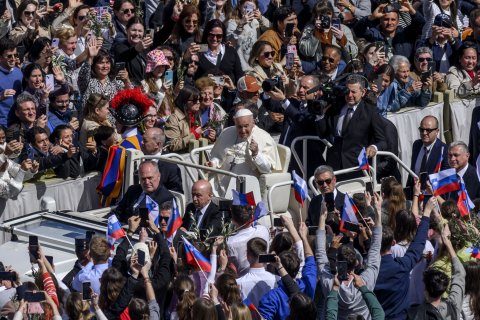
"He could, for instance, forbid the German bishops from continuing to implement and finance the agenda of the Synodal Way," Murray said. "He has not done that. The pattern is one of strong words and actions against more conservative Catholics, contrasted with a history of cooperation with and promotion of more liberal Catholics, who occasionally receive relatively mild criticisms and are rarely disciplined."
Faggioli said it was true that Francis has adopted a harsher tone with American traditionalists: "But they have also gone further than other bishops around the world."
He said the two camps have taken wildly different approaches, where progressives abroad use more conventional language when criticizing Francis and traditionalists American Catholics are taking to social media to voice their complaints with the pontiff.
"It's not getting any better. It will never get better. It will remain that complicated," he said of the relationship between Francis and the church in America. "It's the most problematic relationship Pope Francis has had with one national church. There's no question of that."
While the United States has taken center-stage in the culture wars, the challenge for Francis is a global one.
"On the one hand, he wants to move the church forward," William Dinges, a religious studies professor at the Catholic University of America, told Newsweek. "He wants to avoid going too far and transforming Catholicism into just another form of cultural religion. On the other hand, he also wants to avoid turning the church into a sectarian, over-and-against ecclesial community. He's trying to find that sweet middle ground."
Update 04/02/2024 10:45 a.m. ET This story was updated with Faggioli's academic affiliation.



